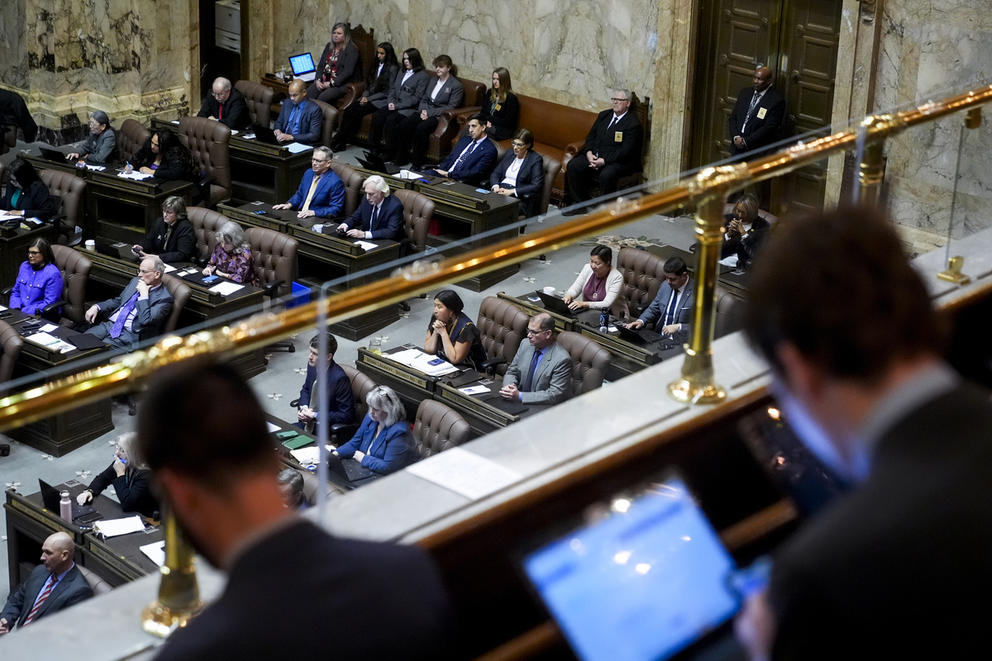“We understand why there are rules that prevent staff from lobbying or commenting on a bill, and we don’t disagree with those rules,” said a current staffer for the Democrats, who asked not be named, in an interview with Crosscut. “What’s frustrating is it feels like it’s impossible to talk about our working conditions and the impact they have on us.”
Lawmakers lifted the state’s prohibition on legislative staffers unionizing in 2022, allowing them to begin organizing this May. Before that deadline, legislators intended to pass a second bill that would outline what unions can negotiate over and outline the composition of bargaining units.
The proposed bills outlining collective bargaining for staffers, House Bill 2325 and Senate Bill 6194, dropped in both the House and Senate at the beginning of the session. They drew criticism from current and former legislative staffers for prohibiting any bargaining over the hiring or firing of employees. Protections against such “at-will” employment, under which employees can be fired without cause, make up the foundation of many union contracts. Staffers also want the right to negotiate overtime worked during the session.
The half-dozen current and former staffers Crosscut talked with said a bill should not take these subjects off the table before bargaining even begins.
“We all want what’s best for the legislature,” the staffer added. “But because we don’t necessarily agree on what that looks like, that’s what bargaining is for.”
This story is part of Crosscut’s WA Workplace Watch, an investigative project covering worker safety and labor in Washington state.
Amendments proposed in the Senate’s Labor and Commerce Committee on Tuesday, if passed, would allow bargaining over just-cause protections and overtime hours. Members postponed a vote on them until later in the week.
A prime sponsor of the House bill, Rep. Joe Fitzgibbon, D-Burien, a former legislative staffer himself, said the prohibition on negotiating at-will employment status remained one of the big issues still being debated.
“We don’t have a great set of options,” Fitzgibbon said in an interview with Crosscut. “But we’re trying to think of some options for how you both maintain the ability of the Legislature to adapt to election results, for example, but also maybe there are more protections for employment.”
Skeptics of the effort to adopt union rights for staffers argue that new protections could hamstring officials during the session or ignite new staffing disputes. Sen. Curtis King, R-Yakima, who voted against lifting the prohibition on collective bargaining for staffers in 2022, said there is already a process for submitting complaints and dealing with grievances.
“I’m not sure what we’re gaining here,” King said, “other than we’re gonna give more money to the unions.”
Abbie Hart, who worked for former Rep. Mike Sells, D-Everett, between 2016 and 2018, said the bill appears to be negotiating before folks even get to the table.
Hart now works at Washington Public Employees Association as a union representative and contract negotiator. She said most public-sector workers trying to organize consider just-cause protections a high priority.
“One of the biggest, most important topics for union-represented workers in the public sector in Washington state is sort of being cast aside before getting to the bargaining table,” Hart added.
Much of the push to establish collective bargaining rights has come from Democratic caucus staff and legislative assistants, who are tasked with answering constituent emails and scheduling meetings for legislators. Some aides are also involved in policy meetings. The proposed changes would not adopt unionizing rights for temporary legislative workers like pages or interns.
“A union brings the ability for staffers to have a say in working conditions,” said another current staffer for the Democrats, who also asked not to be named. “That means a lot of different things. That can be salary. It can be overtime. It can be what protections there are for workers.”
Current staffers said workers have been sometimes forced out by long hours or low salaries. Legislative assistants also serve in a unique position: Their bosses are elected officials who cannot be removed without a vote of the public. And if the elected official they work for loses reelection, that could mean they too are out of a job.
“It’s a very strange mix,” said Natalia Koss Vallejo, a former legislative aide for Sen. Noel Frame, D-Seattle, about her past job. “In some cases, you feel like a very overworked receptionist, and then the next minute you are in an important policy meeting.”
Koss Vallejo, who now works as a consultant, said she was never prouder than when she was serving constituents. But some mornings that meant starting the day with an inbox of thousands of new emails.
“It’s a lot of work and the stakes are incredibly high,” she said. “If you missed a phone call or an email, that might mean that the law doesn’t get passed this year.”
Without a union, staffers do not have a formal pathway to report complaints, Koss Vallejo argued. Common complaints include, she said, an abusive boss who has a lot more power, or a legislator not respecting boundaries and texting staff late at night.
“And [staffers] can’t demand change or ask for help, cause it could be considered lobbying,” she said.
Only a handful of states, including Maine and Oregon, allow legislative staffers to unionize, according to the Office of State Legislative Labor Relations. It took roughly a year and half for legislative aides in Oregon to finalize a contract, according to Oregon Public Broadcasting.
Find tools and resources in Crosscut’s Check Your Work guide to search workplace safety records and complaints for businesses in your community.
Maxford Nelsen, director of research and government affairs for the Freedom Foundation, said the group had previously challenged an Oregon law that gave collective bargaining rights to legislative staffers, but is not taking an official position on the Washington bill. If the new bill passes, he predicts the Legislature will become a less efficient and productive body.
“There’s going to be more disputes about workplace rules, workplace requirements, workplace policies. Grievances will be filed by staff against administration, maybe against members in some cases,” Nelsen said. “But if that’s what the majority wants to see happen, then as a conservative policy organization, I don’t know that we’d be too frustrated by a less-productive progressive legislature.”
The 2022 bill also established the Office of State Labor Relations and tasked the agency with providing guidance to legislators about what subjects unions would be allowed to bargain over and the composition of bargaining units. The office released a 100-page report last October with a framework for the current bill.
The proposed bill would allow about 400 partisan employees to unionize throughout elected representatives’ offices, caucuses, the Office of Legislative Support Services, the Legislative Service Center and the Office of the Code Reviser. It also separates House and Senate employees into separate bargaining units.
As legislation was being developed, the Office of State Labor Relations asked the Legislative Ethics Board to weigh in on whether employees could participate in union activities such as rallies or lobbying for bills impacting their union. The board, unable to come to a consensus, declined to provide any guidance.
A proposed amendment would exempt from the state’s ethics restrictions any lobbying activities related to collective bargaining.
The House Labor & Workplace Standards Committee is also scheduled to hear the bill this week.






